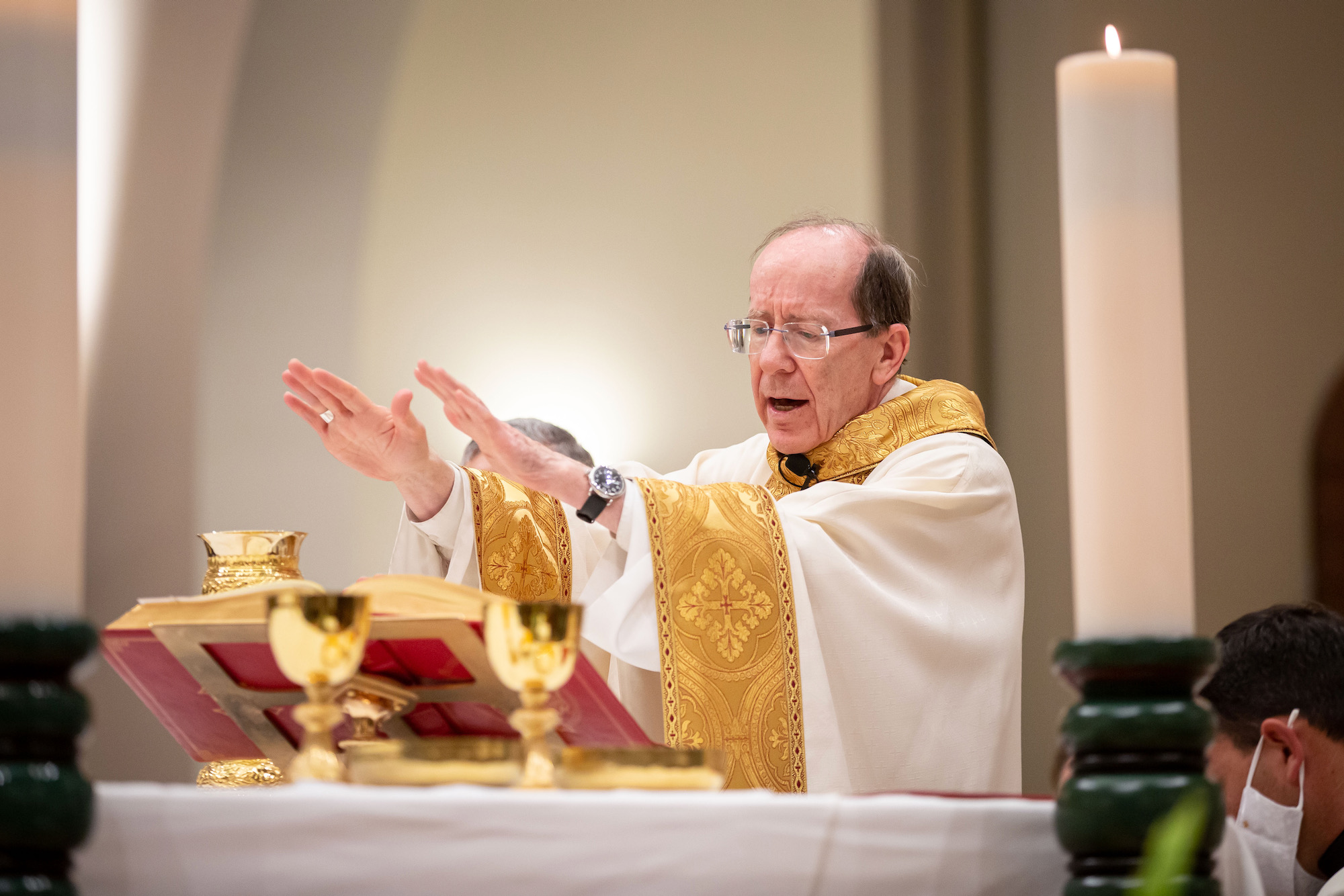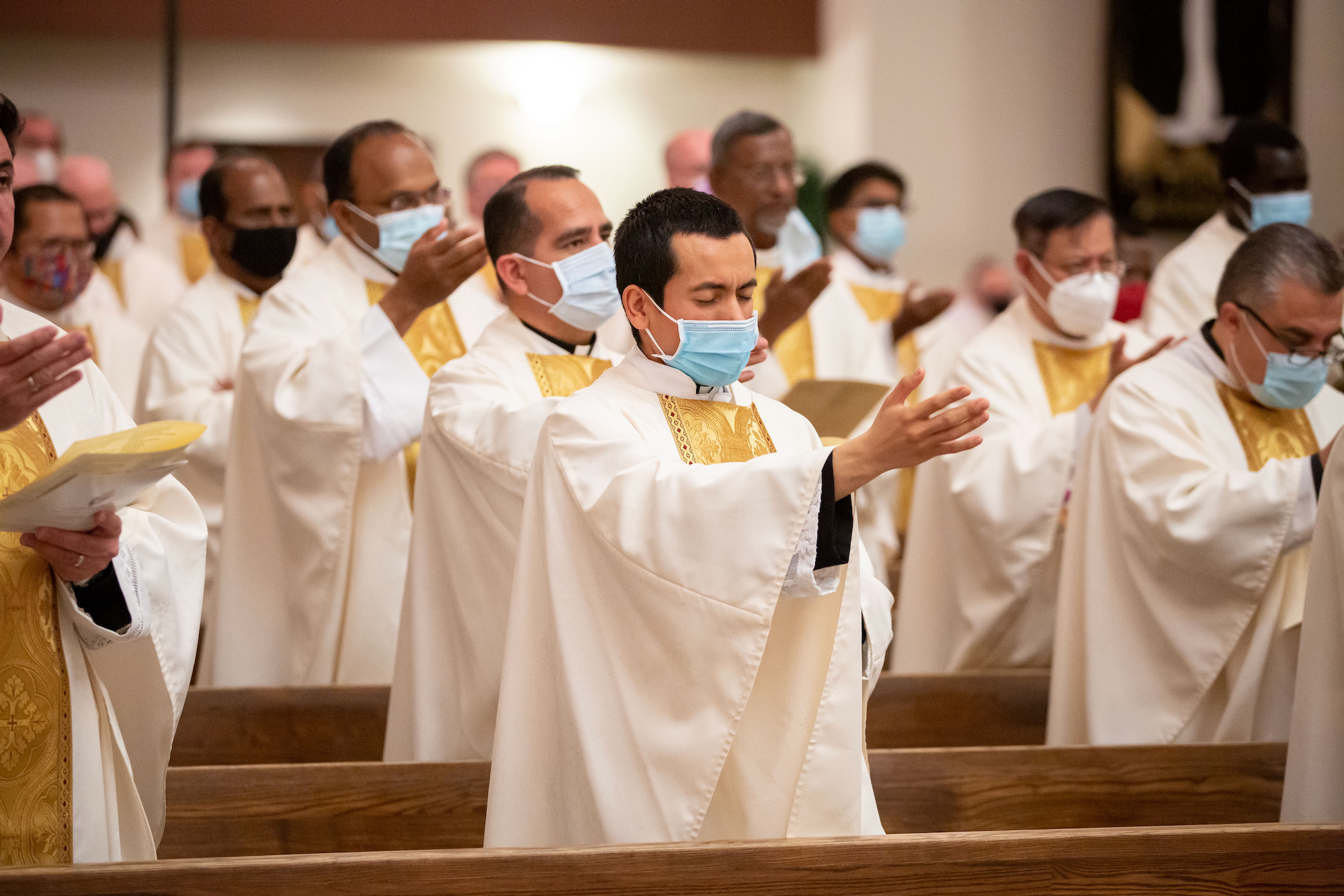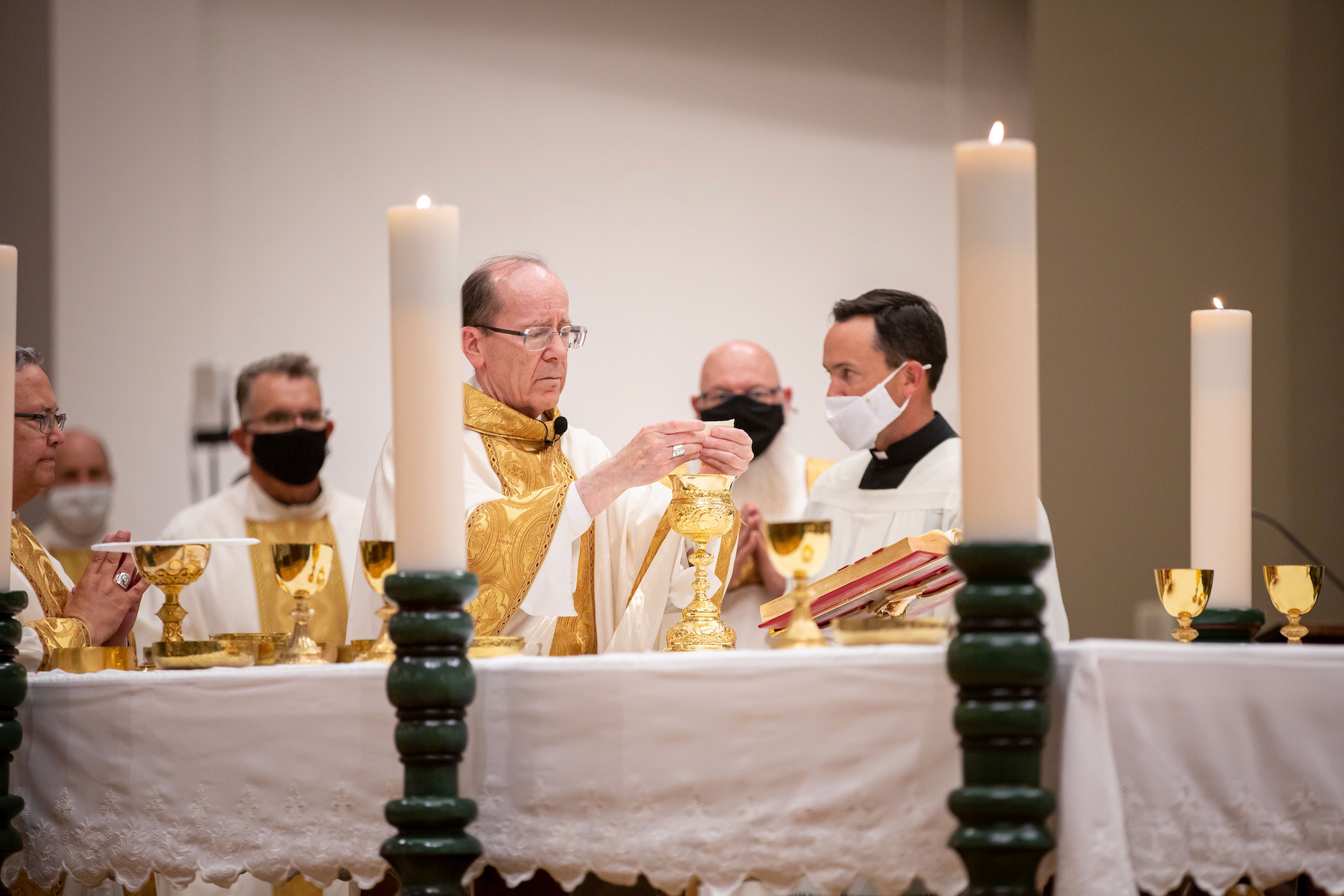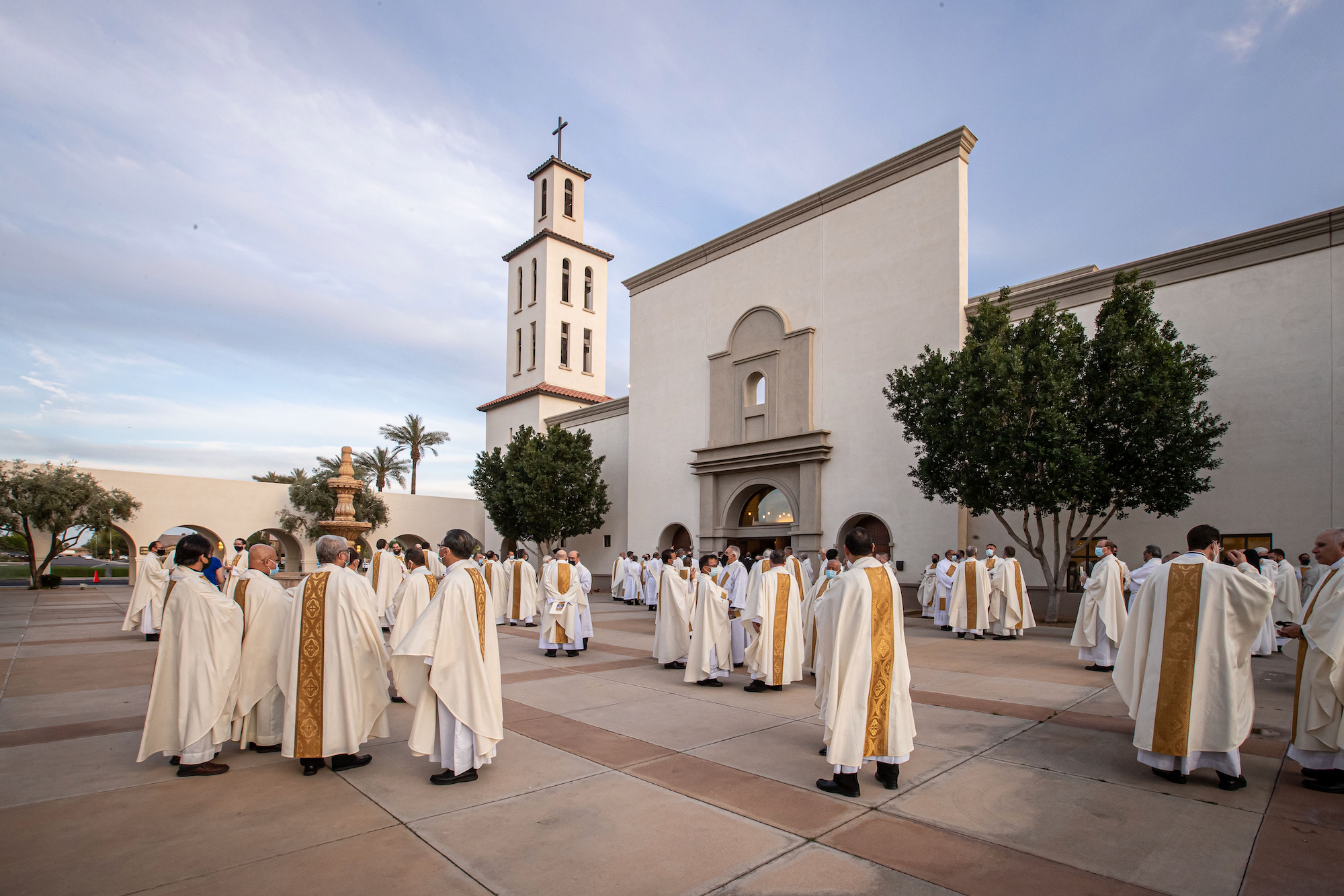
Read: Veneremur Cernui – Down in Adoration Falling
En Español: Veneremur Cernui – Veneremos inclinados
Holy Week is a spiritual marathon of sorts, packed with liturgies, solemnity and tradition. This year, it also included a powerful Apostolic Exhortation on the Eucharist.
“Veneremur Cernui – Down in Adoration Falling,” issued on Holy Thursday by Bishop Thomas J. Olmsted of the Diocese of Phoenix, captured the attention of clergy and faithful alike in the days leading up to Easter.

Bishop Olmsted said his primary hope in writing the Apostolic Exhortation is that the faith of practicing Catholics in the Eucharist will be deepened and fortified, propelling them into giving witness to others.
“The primary evangelizers we especially need now are lay people who are so grateful for their faith,” Bishop Olmsted said. The wonder and awe engendered by the Eucharist spurs these evangelizers who “just can’t help but tell somebody once in a while, ‘I can’t live without going to daily Mass, I couldn’t live without doing adoration.’
“That’s what I’m especially hoping for: personal witness of the Eucharist,” Bishop Olmsted said.
Fr. John Muir, director of the office of worship and pastor of St. Thomas Aquinas Parish in Avondale, echoed those thoughts.
“Bishop is calling people who love their faith and are highly engaged to really see their own responsibility to reach out to people in their circle and say, ‘hey, come with me to daily Mass, come with me to Eucharistic adoration, come with me to Sunday Mass,” Fr. Muir said. “It’s in the context of those friendships, I think, that people will discover the Eucharist.”


The Apostolic Exhortation makes a number of requests of pastors, including that they hold eucharistic processions yearly. The office of worship is in the process of acquiring the various accouterments often used, such as the processional canopy. Parishes would be allowed to borrow these items.
“Not every parish has those kinds of things,” Fr. Muir said. Beyond that, the public nature of eucharistic processions holds a particular appeal.
“Everything’s been out of the public square because of COVID,” Fr. Muir said, pointing out that the many instances of political witness in the streets over the last year or so that have been violent and filled with bitterness and resentment.
“I love Bishop’s call for the Church to be a joyful, confident, loving witness in the street. Our faith isn’t meant to be just in the church. Our faith is meant to be in the world.”
Fr. Fernando Camou, who spent the last year living at Nazareth House, a seminary house of formation, but was recently appointed rector of Ss. Simon and Jude Cathedral, also shared his insights on the Apostolic Exhortation.
“One of the things that just jumped out to me is the sentence where he says, ‘Sunday is a day of protest against the idolatry of the world,’” Fr. Camou said. “Especially in our day when protests are kind of like the soup du jour. There’s something in every human heart that wants to stand up for something.”
Fr. Camou said his hope is that people will not only read the Apostolic Exhortation, but that they’ll take time to study and ponder it as well, not getting overwhelmed by its length or the lesser-known aspects of theology it delineates.
The scriptural, historical and theological truths of the Eucharist are expounded upon in the Apostolic Exhortation, but they are written about in a style that’s approachable to the average layman who may not be able to articulate what the Church has always taught in that regard.
Fr. Paul Sullivan, director of vocations for the Diocese of Phoenix and pastor of Sacred Heart Parish in Phoenix, underlined the point.
Jesus, he said, is present to us in Scripture, in the community, but is “especially present and fully present in the Eucharist,” Fr. Sullivan said. If Jesus weren’t physically present in the Eucharist, He would only be present in a spiritual sense and “not present to us completely. And so in his infinite love He says, ‘I will not withhold any part of my presence.’”
Fr. Sullivan said he likes the fact that the Apostolic Exhortation points to the importance of the Exodus story in the Old Testament and how Jesus is the new Passover, the fulfillment of the whole system of law, rituals and rites.
“Jesus is the fulfillment — the whole story points to Him,” Fr. Sullivan said.
For men preparing for priesthood, the Exhortation is an invitation to renewed zeal for the Eucharist, Fr. Camou said.
“They will receive this as a challenge from their spiritual father to really examine, ‘Am I actually keeping Sunday holy? Am I striving to open my heart to surrender greater and greater every day before the Lord in the Eucharist? Am I allowing Him to change me?’”


Worthy reception
One topic addressed by the Exhortation is the worthy reception of the Eucharist. People visiting the United States from Catholic countries abroad are sometimes astonished by the length of Communion lines in comparison to the line outside of confessionals. Then there’s the controversy over Catholic politicians receiving Communion.
“By receiving the Body of Christ in Holy Communion we manifest our union with the Mystical Body of Christ, the Church,” the Apostolic Exhortation states. “Therefore, if with our ‘Amen,’ we refuse to accept and live by the whole teaching of Christ and His Church, we are not in communion with Him but living a ‘fake’ union, one that overlooks truth and justice.”
Fr. Muir spoke to that particular issue.
“Part of the struggle for a lot of Americans is they tend to think of the Eucharist as a thing to receive or a kind of reward for going to Mass, a golden dew drop from heaven. But it’s not that at all,” Fr. Muir said. When people understand the Eucharist is the Body of Christ given to members of His living, mystical body, they understand that as members of that body, there must be a union of heart, mind and will. It’s not a reward for some and its withholding is not a punishment for others at all.
“It’s the body of Christ given to strengthen the body of Christ so Christ’s body can fulfill its mission on Earth. And that’s true for politicians, it’s true for firemen, it’s true for teachers, and it’s true for moms and dads and it’s true for all of us,” Fr. Muir said.
Fr. Muir is hoping the faithful will embrace Veneremur Cernui and delve into its spiritual truths.
“Our younger adults who are walking away from the faith are walking away because they haven’t been challenged intellectually by the faith,” Fr. Muir said. “They don’t find it credible. So we can’t be afraid of deep, challenging explanations of the Eucharist which are coherent. And that’s what Bishop’s giving us.”
The belief in the Real Presence of Christ in the Eucharist is not shared by Evangelicals, a growing number of whom were baptized Catholic.
“I’m so grateful for Evangelicals because especially the word of God is alive for them and that’s the first half of the Eucharist,” Bishop Olmsted said. “What they don’t realize is that the Word is made flesh and the Word is made present in the Eucharist.”
He is hoping the Veneremur Cernui will help Catholics be able to understand more fully and articulate better the truth of the sacrificial nature of the Eucharist.
“I think in many places it’s been more thought of as a banquet rather than the Eucharistic sacrifice and the resurrection and that’s what I wanted to make clear from the very beginning,” Bishop Olmsted said.
“I would hope this would help us have conversations with them, just share with them how grateful we are for their witness to Jesus and a personal relationship with Him and that there is no more personal way to relate to Jesus than through the Eucharist, receiving His own Body and Blood.”






